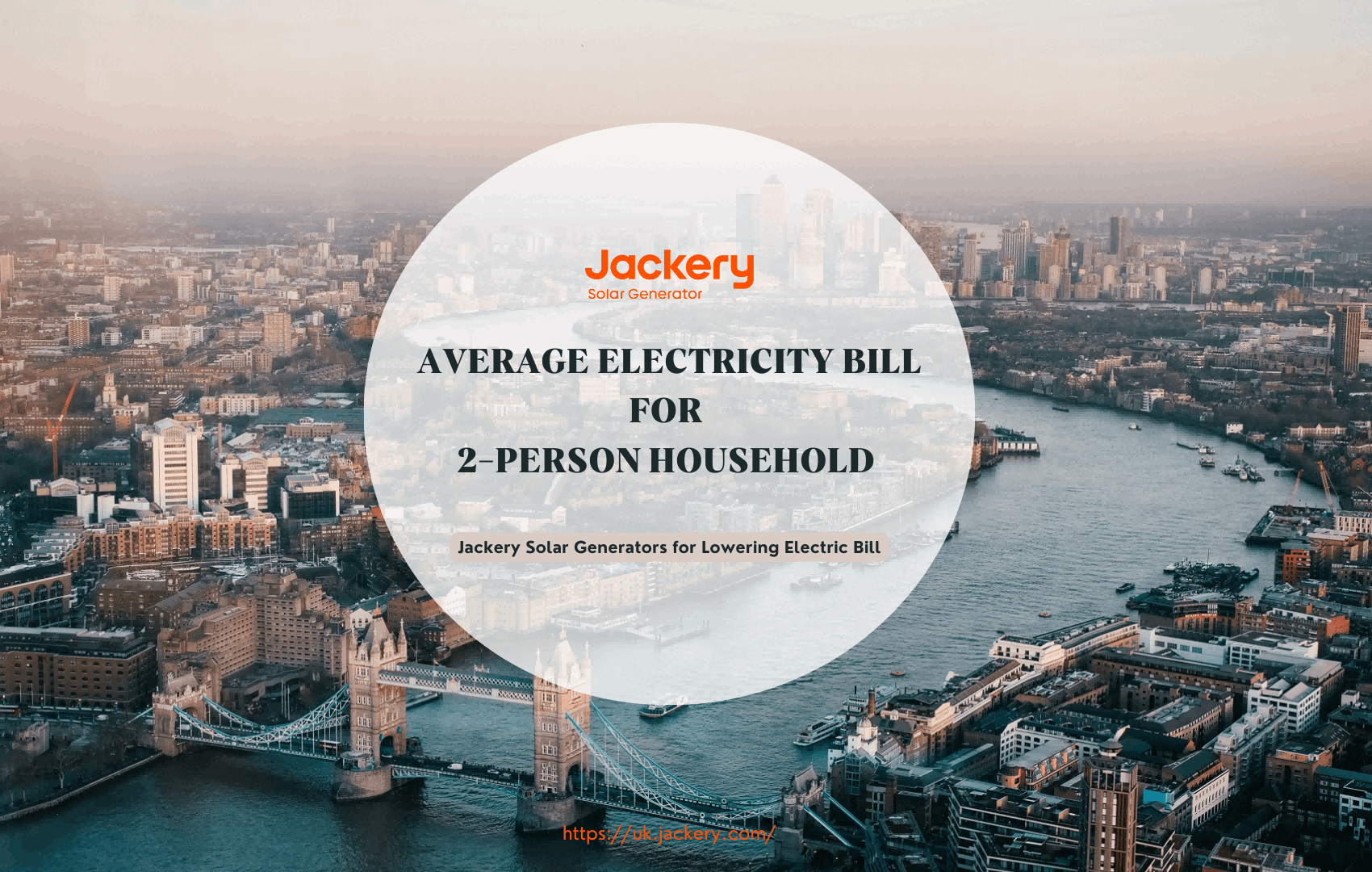As electricity bills in the UK are much higher in 2024 than in previous years, the concept of an "average electricity bill" has become distorted. So, in the UK, the average electricity bill is a long-standing concern for households across the country, reflecting both consumption habits and the broader economic situation.
Many people are curious about the UK's average electricity bill for a 2-person household. To understand the average electricity bill for a 2-person household in the UK, first understand the average electricity cost in the UK. So what is the monthly electricity bill in the UK? As of July 1, 2024, the average electricity bill in the UK is £603.72 per year.
Knowing the average electricity bill is essential to help you check whether your current electricity bill is too high. Also, we highly recommend Jackery Solar Generator, the portable solar power solution, to charge your household appliances with unlimited solar energy to save your electric bills effectively.
|
Key Takeaways: |
|
l The energy market in the UK has been changing in recent years. In the UK, electricity bills generally include electricity consumption and fixed charges. l Understanding the average electricity bill for a 2-person household in the UK is essential in effectively managing electricity costs. l Factors that affect electricity costs in the UK include electricity consumption scale, seasonal changes, and energy market changes. l UK residents can use practical and intelligent strategies to control electricity costs. l Utilising renewable energy sources such as solar power like the Jackery Solar Generator 1000 v2 and 2000 Plus can significantly reduce the electric bill. |
Are Electricity Bills High in The UK?
In the summer of 2021, as economies began to reopen, prices for gas, electricity, oil, and other fuels started to rise worldwide. Energy prices rose further in late 2021 and early 2022 and soared in early 2022.
Moreover, energy prices have been volatile in 2022 and even in 2023. But since December 2022, the general trend has been for prices to fall. This volatility continued throughout 2023, but in 2024, energy prices have been rising steadily.
During this "energy crisis", wholesale electricity prices in the UK, Europe, and elsewhere hit new highs and have yet to return to their previous levels.
For example, the first significant impact of this "energy crisis" on domestic UK customers (those on standard variable electricity tariffs and therefore covered by the energy price cap) was a 54% increase in the price cap in April 2022. Without government intervention, the record prices in 2022 would have resulted in an 80% increase in the UK energy price cap.
The chart below, taken from Ofgem's wholesale market indicators, shows how volatile electricity prices have been over the past few years. Although prices have fallen in 2023 and become less volatile, they are still around double what they were at the start of 2021.

(Data Source: Ofgem and ICIS)
Factors such as limited gas reserves, environmental restrictions, and high demand for LNG in Asia have affected the energy market in the UK in 2023. With electricity costs of 27p per kWh, the energy price cap (EPC) is £1,923 per year for the average household.
However, due to typical seasonal fluctuations in energy demand, energy prices are expected to rise again in January 2024. From January 1, 2024, the energy price cap will increase to £1,928 per year for the average household, equivalent to 28.6p per kWh of electricity.
However, it is essential to note that the energy price cap applies to the unit cost per kWh, not the total amount paid. Therefore, households with higher energy usage will pay more than the amount of the energy price cap.
The surge in energy prices has caused the average electricity bill in the UK to rise from £764 in 2021 to nearly £2,000 in 2022. Therefore, the increase in electricity bills has a significant impact on consumers. According to a recent survey, almost half of all UK adults are minimising their electricity use at home due to rising living costs. In addition, 38% of adults find it difficult to afford high energy bills.
How Is The Electricity Bill Calculated in The UK?
When your meter is read, the electricity company will subtract the amount shown in the last reading from the most recent meter reading to work out your bill. Your electricity bill should include the following data:
- Your most recent meter reading (estimated or based on data you submit)
- The amount of electricity or gas you used during the billing period and your annual consumption
- VAT charges
- The price you paid per kilowatt-hour (unit rate)
- The name of your plan
- Your meter number
How are electricity bills calculated in the UK? Generally, your electricity bill is calculated based on the number of units of electricity you consume. You also pay a fixed charge.
- Unit Rate
The unit rate is what you pay for each kilowatt-hour (kWh) of electricity, usually billed monthly. The unit of electricity is measured in kWh. The more kWh you use, the more you pay.
These rates may be fixed or variable, with higher charges during peak hours (when everyone is using) and lower charges late at night (when few people are using). The exact unit cost of electricity depends on your supplier, the type of meter you use, where you live, your electricity tariff, and how you pay.
2. Fixed Charge
The fixed charge is a daily or monthly fixed fee that energy suppliers charge consumers for the maintenance and upkeep of the energy supply infrastructure, regardless of how much electricity they use.
The fixed charge will vary depending on the supplier, where you live, how you pay, and which meter you use. The average fixed charge in the UK is 60.10p per day for electricity.
Fixed charges cover the supplier's costs of:
- Maintaining the energy supply network that delivers electricity to your home
- Reading your meter
- Supporting government social and environmental schemes such as the Warm Home Discount scheme
- Failing suppliers exiting the energy market (supplying electricity only)
Here are the average unit rates and fixed charges for different parts of the UK (up to April 1, 2024)

(Data Source: Ofgem and regional electricity providers)
Average Electricity Bill for 2-Person Household
To understand the average electricity bill for a 2-person household in the UK, first understand the average electricity cost in the UK. So what is the monthly electricity bill in the UK?
As of July 1, 2024, the average electricity bill in the UK is £603.72 per year (excluding annual electricity bills). The above data assumes that the household also uses natural gas. This number will be much higher if the household only uses electricity for heating and power.
Understanding the average electricity bill for a 2-person household in the UK is essential in effectively managing electricity costs. Electricity usage for a 2-person household can vary depending on various factors, including appliance usage, heating and cooling needs, energy-saving practices, and lifestyle habits.
Here are some typical household appliances' electricity consumption and running costs:
|
Appliance Type |
Assumed Electricity Consumption |
Usage Time |
Cost to Run (22.36 pence per kW) |
|
Laptop |
200 watts (0.2 kW) |
1 hour |
£0.04 |
|
Microwave |
900 watts (0.9 kW) |
15 minutes |
£0.05 |
|
Kettle |
1000 watts (1 kW) |
5 minutes |
£0.01 |
|
Dishwasher |
1800 watts (1.8 kW) |
1 hour |
£0.40 |
|
Tumble dryer |
3000 watts (3 kW) |
1 hour |
£0.67 |
According to Ofgem's statistics, the typical UK household (2-3 people) consumes 2,700 kWh of electricity per year or 225 kWh monthly. However, these data will vary depending on factors such as region, energy supplier and selected energy rate.
Ofgem uses its energy price cap to limit electricity prices, adjusted every three months. The cap covers all electricity suppliers' default standard variable electricity prices. It covers a daily fixed charge and the cost per unit (kWh) of electricity you consume.
Calculate the Average Monthly Electricity Bill for a 2-person Household in the UK in 2024
Let's take 2024 as an example and calculate the average monthly electricity bill for a 2-person household in the UK in 2024.
January to March
The fixed charge cap is 53.35p per day, while the per unit cap is 28.62p per kWh from January 1 to March 31, 2024. So the average monthly electricity bill for a 2-person household in the UK is £80.40. It includes:
Fixed charge: 53.35p 30 days usage = £16.00
Consumption: 28.62p 225 kWh electricity = £64.40
Each household uses water differently, so don't be surprised if your bill is higher or lower than this figure.
April to June
During the price cap period from April 1 to June 30 2024, prices should fall to 60.10p per day (daily fixed charge) and 24.50p per kWh. So the average monthly electricity bill for a 2-person household in the UK is around £72. It includes:
Fixed Charge: 60.10p 30 Days Usage = £18.00
Consumption: 24.50p 225 kWh = £54.13
July to September
The average unit rate and fixed charge from July 1 2024, to September 30 2024, is 22.36p and 60.12p. So the average monthly electricity bill for a 2-person household in the UK is about £68. It includes:
Fixed Charge: 60.12p 30 Days Usage = £18.04
Consumption: 22.36p 225 kWh = £50.31
October to December
The average unit rate and fixed charge from October 1 to December 31 2024, is 24.50p and 60.99p. So the average monthly electricity bill for a 2-person household in the UK is about £73. It includes:
Fixed charges: 60.99px 30 days usage = £18.30
Electricity consumption charges: 24.50px 225 kWh of electricity = £55.13
The above data can be used to calculate the average monthly electricity bill for a 2-person household in the UK in 2024.
|
Average Electricity Bill for 2-Person Household in the UK in 2024 |
|||
|
Time |
Electricity Consumption Costs |
Fixed Costs |
Monthly Electricity Bill |
|
January to March |
£ 64.40 |
£16.00 |
£ 80.40 |
|
April to June |
£ 54.13 |
£18.00 |
£ 72.13 |
|
July to September |
£ 50.31 |
£18.04 |
£ 68.35 |
|
October to December |
£ 55.13 |
£18.30 |
£ 73.43 |
What Factors Affect The Electricity Bill in The UK?
Why are electricity prices so high in the UK? The UK is vulnerable to the global energy crisis because the country relies on energy imports. The global energy crisis has also pushed up the electricity costs paid by energy suppliers, which are now passed on to consumers. Factors that affect the electric bill in the UK include:

Factor 1: Size of Power Consumption
The size of your home and the number of people living in it can significantly affect how much electricity you consume. A larger home means more rooms or spaces needing to be heated, and more people means more hot water and electricity bills. For example, a five-person home is likelier to have higher electricity bills than one or two people.
Factor 2: Seasonal Changes
How do seasonal changes affect electricity bills throughout the year? In the summer, people may use less electricity. Because the sun shines longer in the summer, you don't need to turn on the lights as often. And the weather in the UK is not too hot, so there is less need to use air conditioning. In the winter, people usually use more electricity for heating and lighting so that the bills will be higher.
Factor 3: Decline in Renewable Energy Generation
Lower winds lead to low wind power generation. When wind power generation is low, the UK must use more coal and gas to produce enough electricity, which leads to higher electricity prices. In addition, the cessation of some nuclear power plants also means that a higher proportion of the UK's electricity generation uses natural gas in production.
Factor 4: Energy Market Problems
Since 2021, 28 energy suppliers in the UK have gone bankrupt. Mainly because the business model of many of these suppliers cannot cope with the increase in wholesale prices, so when energy suppliers go bankrupt, consumers' electricity bills will be increased to help absorb the costs.
Factor 5: Decline in Renewable Energy Generation
Although the government's £15 billion support plan will provide households with £400 electricity subsidies for six months from October, this will not have a significant impact like measures taken in other European countries. For example, France has limited electricity price increases to 4%.
How Can You Lower Your Electricity Bill?
Reducing your electricity bill or power consumption doesn't mean you have to sacrifice your home's comfort. UK residents can use practical and intelligent strategies to control electricity costs and contribute to a more sustainable home economy. To ensure you pay less than the average for electricity, take the following steps to reduce your electricity bill.

Tip 1: Switch to Energy-efficient Appliances
Modern appliances often have higher energy efficiency ratings, making running cheaper. Therefore, you can choose energy-efficient and environmentally friendly products when choosing appliances.
Tip 2: Insulate Your Home
Depending on the season, a well-insulated home is better at retaining heat inside or outside. So, improving your home's insulation and cold-proofing can reduce heating and cooling costs. Insulate the walls, floors and loft to keep cool air inside in summer and minimise heat loss in winter. In addition, closing blinds and curtains can also keep more heat inside or outside.
Tip 3: Control Hot Water Usage
Heating water consumes energy that cannot be ignored. You can reduce the energy use of hot water by installing a smaller shower head, fixing regular leaks and washing clothes in cold water. Consider using a solar hot water system as an alternative to traditional electric heaters.
Tip 4: Maintain Appliances Regularly
Regular maintenance will help keep your home's systems and equipment in good working order, avoiding overconsumption and unexpected repair costs. For example, regularly changing the air filters in your heating and air conditioning systems can improve efficiency and help you avoid energy use and energy bills.
Tip 5: Cultivate Energy-Saving Awareness
Involve all family members in energy-saving practices and cultivate their energy-saving awareness. Over time, the energy and electricity bill savings will be significant.
Tip 6: Compare Energy Costs
Reviewing and comparing electricity prices from different electric suppliers in your area can help you find a more cost-effective option. In particular, you can use comparison sites like Finder to look at electric plans that fit your usage patterns and switch to an electric supplier that offers better prices.
Tip 7: Use Solar Energy
Installing and using solar energy to replace part of the electricity from the grid can help reduce your electricity bills. During the day, a solar system will generate real-time electricity to power home appliances, lights or technology. Excess electricity can be stored in the solar panels for use at night.
Solar generators, like Jackery Solar Generator, can be an environmentally friendly energy source to reduce energy consumption and lower household electricity bills. Solar investments in electricity can benefit from various incentives, rebates, and feed-in tariffs, increasing home value while saving energy.
Jackery Solar Generators for Reducing Electric Bills
Implementing a solar energy system in your residence provides numerous advantages. Jackery is a renowned manufacturer in the solar industry, focusing on producing top-notch solar equipment like solar generators, solar panels, and portable power stations.
Jackery Solar Generators offer a reliable and uninterrupted power supply for your household and outdoor appliances to reduce your electric bills.

In conjunction with Jackery Solar Panels, a Portable Power Station facilitates the efficient conversion and storage of more sunlight for future use. By having numerous output ports, you can charge multiple appliances at the same time.
Jackery Solar Generator 2000 Plus
Jackery has unveiled the Solar Generator 2000 Plus, a cutting-edge portable power solution with exceptional performance. Thanks to its substantial capacity and formidable power output, this device can sustain the operation of standard domestic appliances for several weeks and fulfil all the power needs associated with outdoor adventure or professional activity.
The Jackery Solar Generator 2000 Plus allows adding extra battery packs, which boosts the capacity from 2 kWh to a remarkable 12 kWh, thus enhancing the solar charging capabilities significantly. With the ability to be expanded to 3000W, this solar product offers a 30% higher rated power than other 2 kWh solar goods available in the market. Practically all essential household equipment is energised.
The Explorer 2000 Plus is an industry's pioneering add-on battery pack that can be recharged using solar panels. This feature enhances versatility, improves charging efficiency, and reduces charging time. The LiFePO4 battery, with its sophisticated technology, guarantees a lifespan of 10 years, even with daily usage limited to once per day. Jackery Solar Panels generate more energy over their lifespan due to their exceptional solar conversion efficiency, reaching up to 25%.

Jackery Solar Generator 1000 v2
The Jackery Solar Generator 1000 v2 is an upgraded version which is smaller, lighter, and even more robust. It is the combination of Explorer 1000 v2 with SolarSaga 100W solar panel.
The Explorer 1000 v2 Portable Power Station has an impressive 1500W power output, over 50% more than earlier models, allowing for easy operation of high-demand appliances such as kettles, refrigerators and portable air conditioners.
Equipped with USB-A/C connections and capacity for up to 100W dual PD charging, this gadget can simultaneously charge many devices, making it the ideal companion for all your power requirements.
The Emergency Charge Mode, activated via the application, enables the Explorer 1000 v2 Portable Power Station to achieve complete charging in under one hour, providing essential power backup during battery depletion. Furthermore, the ability to charge from 0% to 100% within a two-hour timeframe utilising an AC wall outlet prolongs the battery's lifespan.

Is There Any Support To Help with Electricity Bill?
Is there any support to help lower electricity bills in the UK? In other words, if you are struggling to pay your bills in the UK, can you seek help?
First, you can contact your electricity supplier to see what help they can provide. In addition, the government offers subsidies or financial assistance to help residents struggling to pay their electricity bills. (Although you may not necessarily be eligible for support)
Here are some of the UK's assistance for electricity bills: (For more information, please visit GOV.UK)
Warm Home Discount Scheme
The Warm Home Discount Scheme affords a one-off discount on average household electricity bills from September to March. If you get the benefit, your electricity bill could be £150 less or £150 more on your prepayment meter.
The government checks if you qualify for the Warm Home Discount Scheme on a specific date. (Usually August) You need to confirm if you are eligible by August.
|
Warm Home Discount Scheme |
|
|
Eligibility |
|
|
When to apply |
Before August each year |
|
Special requirements |
Your energy supplier must also be part of the Warm Home discount scheme. |
Winter Fuel Benefit
The Winter Fuel Benefit is an annual one-off payment to help you with your winter heating costs. You may be eligible for the Winter Fuel Benefit if you are of state pension age and receive certain benefits. If you are under 80, you will receive £200. If you are over 80, you will receive £300.
|
Winter Fuel Benefit |
|
|
Eligibility (You or your partner needs to be receiving any of the following benefits) |
|
|
When to attain |
Your subsidy will usually arrive in your account in November or December. |
Cold Weather Payment
The Cold Weather Payment is a government program that is a one-off payment to help with extra heating costs. The Cold Weather Payment provides a payment to eligible individuals when the average temperature in their area is recorded or forecast to be 0℃ or below for seven consecutive days.
|
Cold Weather Payment |
|
|
Eligibility (You or your partner needs to be receiving any of the following benefits) |
|
|
When to attain |
You will receive cold weather benefits from November 1 to March 31. |
Average Electric Bill for 2-Person Household FAQs
The following are the frequently asked questions about the average electricity bill for 2-person household in the UK.
- Why are electricity prices rising so fast in the UK?
Electricity prices in the UK are rising because of volatility in global wholesale energy markets, affecting electricity generation costs, especially gas. In addition, infrastructure investment, environmental regulations and currency fluctuations that affect the cost of imported energy can also cause electricity prices to rise.
- Which is cheaper in the UK, gas or electricity?
In general, energy prices are rising. In the UK, gas costs have always been lower than electricity. (Calculated on a cost per kWh basis) However, the relative gas and electricity costs can vary depending on market conditions, tariff type and individual consumption patterns.
- Why is cheap renewable electricity also more expensive?
Cheap renewable electricity is still expensive in wholesale markets due to the intermittent nature of renewable energy sources such as wind and solar.
Final Thoughts
Knowing your average electricity bill is essential for living in the UK as it is a significant part of the cost of living, and saving money on energy bills should greatly benefit you.
In this article, we mentioned the factors that affect electricity usage and electricity bills for a 2-person household in the UK. Improvements in your lifestyle habits can have a significant impact on electricity usage. For example, adopting energy-saving behaviours and investing in a Jackery Solar Generator can help a 2-person household in the UK reduce household electricity bills.

































































































